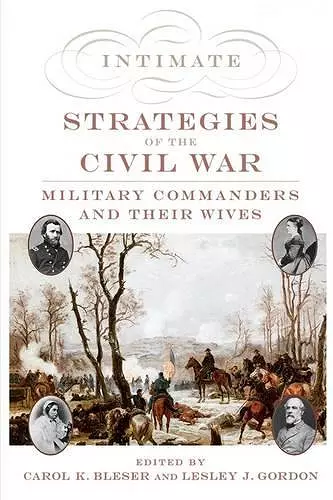Intimate Strategies of the Civil War
Military Commanders and Their Wives
Carol Bleser editor Lesley Gordon editor
Format:Hardback
Publisher:Oxford University Press Inc
Published:8th Nov '01
Currently unavailable, and unfortunately no date known when it will be back
This hardback is available in another edition too:
- Paperback£34.99(9780195330854)

The wives of Civil war commanders had widely divergent roles in their marriages before, during, and after the war - some wives changed their roles as their husbands gained prominence. Most of the wives of military commanders in this collection sought to have some influence over their husband's professional career with mixed success. Carol Bleser strongly asserts that Varina Davis's role in running the Confederate government was much larger than many have previously believed. Shirley Leckie depicts Libbie Custer using her considerable charisma and charm to win political support for her husband and promote the Boy General. Virginia Jeans Laas finds Elizabeth Blair Lee continuously counseling her husband on military affairs and using her powerful family connections to help her husband's naval career. Jessie Fremont was essentially her husband's unofficial chief of staff, even going so far as to pay a visit to Abraham Lincoln to urge him to intervene on behalf of General Fremont. Lizinka Ewell similarly swayed her husband with military advice, pressuring him to keep her son out of harm's way in battle. However, there were limits to these wives' influence. Libbie Custer seemed always careful not to overstep her bounds; Lizinka Ewell, Varina Davis and Jessie Fremont each received harsh reminders of their limitations as women when they tried to overstep traditional gender roles and intercede on their husbands' behalf. Mary Lee, Amelia Gorgas, Julia Grant and Ellen Sherman seemed to fit the more traditional female role of nurturing to their husbands privately, but they were important confidantes who provided emotional support necessary to sustain their husbands on the battlefield. Emory Thomas demonstrates that General Lee regularly confided to his wife, Mary, military details from the front; Ellen Sherman and Julia Grant habitually acted as soothing tonics to their husbands during difficult times especially early in the war, when both men were under a good deal of public scrutiny. John Marszalek argues that Sherman regulary ignored his wife's advice. Yet, Ellen Sherman, like Jessie Fremont, boldly visited the president herself in hopes of gaining Lincoln's support in countering the harsh accusations hurled at her husband. Amelia Gorgas became the family's primary caregiver and financial support when a stroke incapacitated her husband Josiah. After his death, she continued to work to support...
Carol Bleser and Lesley J. Gordon have worked magic here with twelve different scholars and twelve different marriages to provide readers not only with a comprehensive look at the way the war affected marriages but, even more valuable and important, with a view of the different ways marriages worked in the nineteenth century. Framed by the war, enlightened by the literature on marriage, family, gender, and women, this collection is a wonderful addition to scholarship in those fields as well as the field of military history. * The Journal of American History *
Fascinating vignettes of life in Civil War America. * Continuity and Change *
ISBN: 9780195115093
Dimensions: 162mm x 243mm x 28mm
Weight: 603g
328 pages